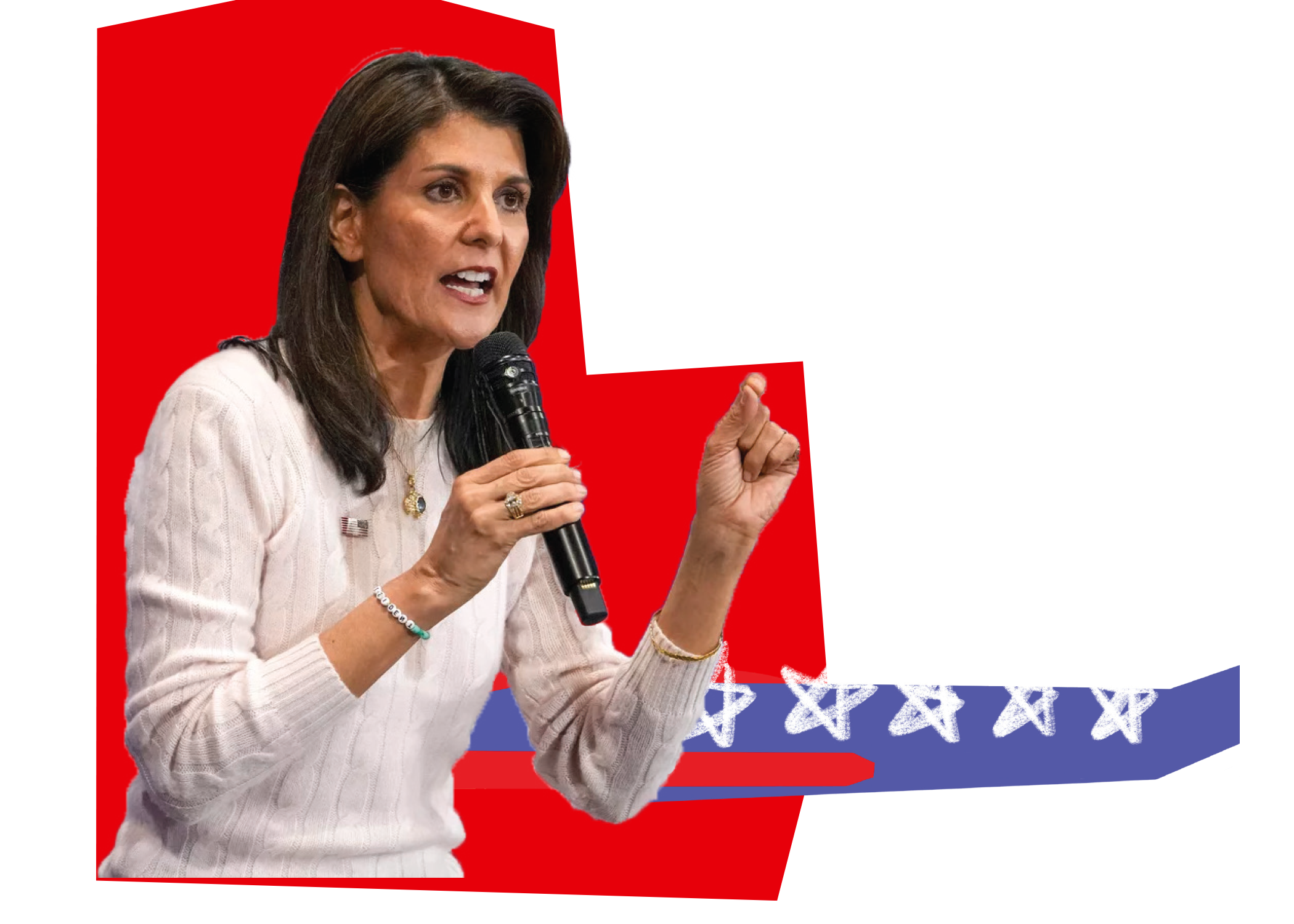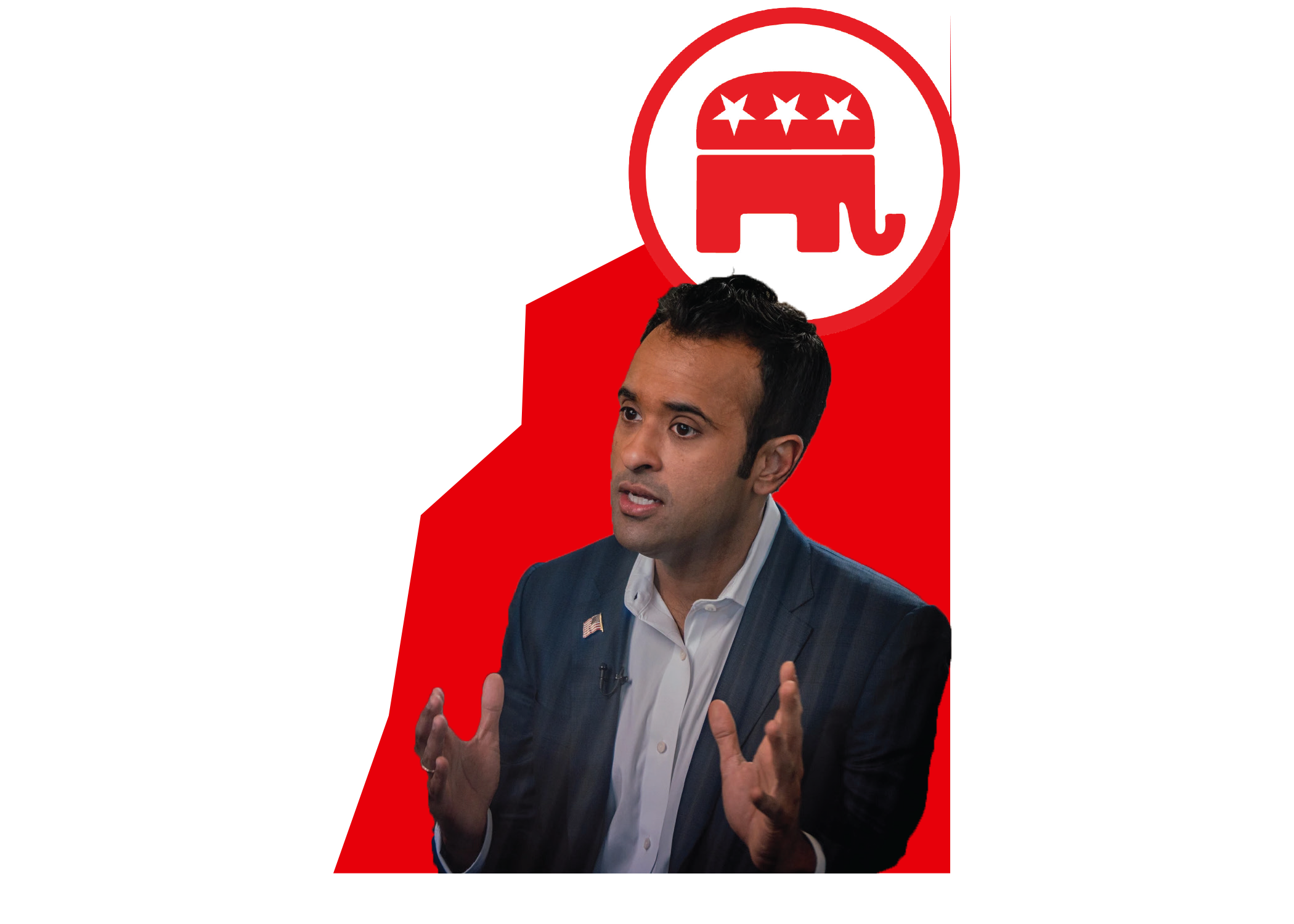Between buttons & bows
Shifting Hindu sentiments may coincide with conservative momentum.
Purnima Nath (Kellogg ‘17) lost the Republican primary for Wisconsin’s 4th U.S. House district last August. The Republican base in her district, which represents Milwaukee, River Hills and additional suburbs, instead chose to put Tim Rogers on the ticket.
Then, on Election Day 2024, the district voted overwhelmingly Democrat.
Nath was inspired to run in her district because Hindus have “always been a micro minority, no matter which part of the world we have belonged to,” she says.
She decided to run as a Republican because she agreed with the party’s policy beliefs. She also says the Democratic party is not for Hindus, and that the political left is too aligned with cancel culture and tries to “dump” their thoughts on her.
Nath’s decision to run represents a larger trend: More South Asian Americans are entering politics. In 2023, five Indian Indian Americans joined Congress. Nearly 50 are in state legislatures, according to The New York Times. In the 2024 election cycle, Kamala Harris, Nikki Haley and Vivek Ramaswamy — three Indian Americans — ran for president.
While Indian Americans seem to remain committed to the Democratic Party, their attachment has declined, according to a Carnegie Endowment for International Peace survey conducted in late 2024. Of those surveyed, 47% identified as Democrats, compared to 56% in 2020. Hindus were 8% more likely to vote for Donald Trump than non-Hindu Indian Americans (35% and 27%, respectively). Data on non-Hindu Indian Americans were not specific and did not distinguish between religious minorities like Muslims, Jains or Sikhs.
Nath, who got into politics during President Donald Trump’s first campaign, says she was attracted to his policies regarding national security, border security and inflation. A campaign issue Nath and Trump share similar views on is illegal immigration. One of Nath’s campaign slogans was “legal immigrant.”
“It is important for me that this country is actually open to legal immigrants at this point in time,” Nath says. “As a Hindu who understands the pain of invaders, I cannot stand for invading this country.”
Nath says her Hindu identity gives her a unique perspective on illegal immigration because of how Hindus have historically faced colonialism in India. Nath finds immigrants in the country unlawfully to be a “slap in the face” to immigrants like her, deeming it unfair.
Still, Nath doesn’t predict Indian Americans will make a major shift to the Republican Party anytime soon and recognizes that Indian Americans still tend to lean Democratic as a whole.
The Carnegie study showed that 58% of Hindus surveyed said they voted for Harris.
Pushkar Sharma is co-founder of the South Asian American Coalition to Renew Democracy (SACRED), an organization working to fight Hindu supremacy in American politics and other forms of hate within the South Asian community. He says he cannot come to any conclusions regarding a shift in political allegiance given that data on the 2024 presidential election is so new.
Nonetheless, he says South Asian American leaders in the Republican Party have pushed a conservative narrative, especially within the Hindu American community.
“I think there is clearly a very strong narrative and leaders pushing community members within faith-based Hindu American communities,” Sharma says. “We can focus on groups like the Republican Hindu Coalition, but also leaders like Vivek Ramaswamy, Tulsi Gabbard and Kash Patel, three individuals who have been floated as appointments to the current Trump administration.”
Since nuAZN spoke with Sharma, Patel has been appointed to serve as the director of the Federal Bureau of Investigation. Gabbard was also confirmed as Director of National Intelligence.
Sharma says it is concerning and dangerous that Hindu politicians push a nationalist agenda for a different religion, betraying the interest of their own religious community.
“For some paradoxical reason, [they] support an anti-secular stance in this country and support a Christian nationalist agenda in this country,” Sharma says.
That kind of contradiction is not new, Sharma says. In the 1930s, an extremist group formed in colonial India called the Rashtriya Swayamsevak Sangh (RSS). The RSS looked up to fascist Italy, Nazi Germany and other supremacy ideologies that paralleled their own. Even today, the RSS continues to push for a Hindu supremacist ideology that puts Hindus above minority religions in the subcontinent.
“It’s very emblematic and continues a trend that we’ve seen historically,” Sharma says. “The relationship between these types of supremacist ideologies is not new.”
Sharma says there are connections between far-right Hindu ideology and white supremacist notions that some South Asian Republicans seem to align with. Additionally, Sharma says political candidates’ outward expressions of their wealth may also make them attractive to South Asian American voters.
“I think we have to look at things through a racial lens but also an economic lens — look at things in an intersectional way [to see] how wealth can have white adjacency,” Sharma says.
According to the Carnegie Endowment Survey, 64% of Indian Americans with a median household income below $50,000 voted for Harris. On the other hand, 58% of Indian Americans with a median household income over $100,000 voted for her.
Some South Asian students who lean towards the left, like Communication second-year Asha Navaratnasingam, condemn her community’s possible shift towards the right.
Navaratnasingam has not noticed a change among her peers at NU. Still, she has heard more South Asians say they’re not included in anti-immigrant and racist rhetoric often spread by Trump, she says.
“I think a lot of POC and South Asians that support Trump and are Republican have this tendency to think that they’re not going to be affected in the same way that other groups are going to be affected because they’re Republican,” Navaratnasingam says. “They can be like, ‘Deporting isn’t going to affect me because I’m a Republican citizen who supports Trump,’ and they just don’t really realize that it will still affect them.”
Navaratnasingam says this is why many of them think anti-immigration rhetoric won’t hurt them. She also says the Republican Party may look more South Asian than it actually is.
“I think that the Republican Party has this tendency to boost the voices of marginalized people that are Republican if it helps their cause, because then they can be like, ‘Look, we’re diverse,’” Navaratnasingam says.
That benefits the party more than the marginalized people whose voices the party is amplifying, she adds.
Though Nath says she aligns with the Republican Party, she hasn’t felt fully accepted because of her Hindu and Indian identity, especially after online debates regarding H-1B visas. Many Trump supporters argue that American jobs shouldn’t go to those coming from outside of the United States. This debate has made her question her American identity.
“If I was an Indian American and I’m a naturalized citizen to America and I have my ethnicity as an Indian, does it mean I’m not American enough?” Nath asks. “Just because we speak for Hindus doesn’t mean we’re not American enough.”
Nath also says the Republican Party does not reach out to her community enough. She adds that the only reason there has been a slight increase in Hindu voters supporting Republicans is because of organizing within the Indian American community.
Nevertheless, she wants to continue to fight from the right.
“It is not the Republican Party who brought us to the Republican Party,” Nath says. “It is people like us who actually, on a grassroot level, campaigned and communicated that the Republican Party is actually good for us for various reasons.”
by Izzie Jacob


